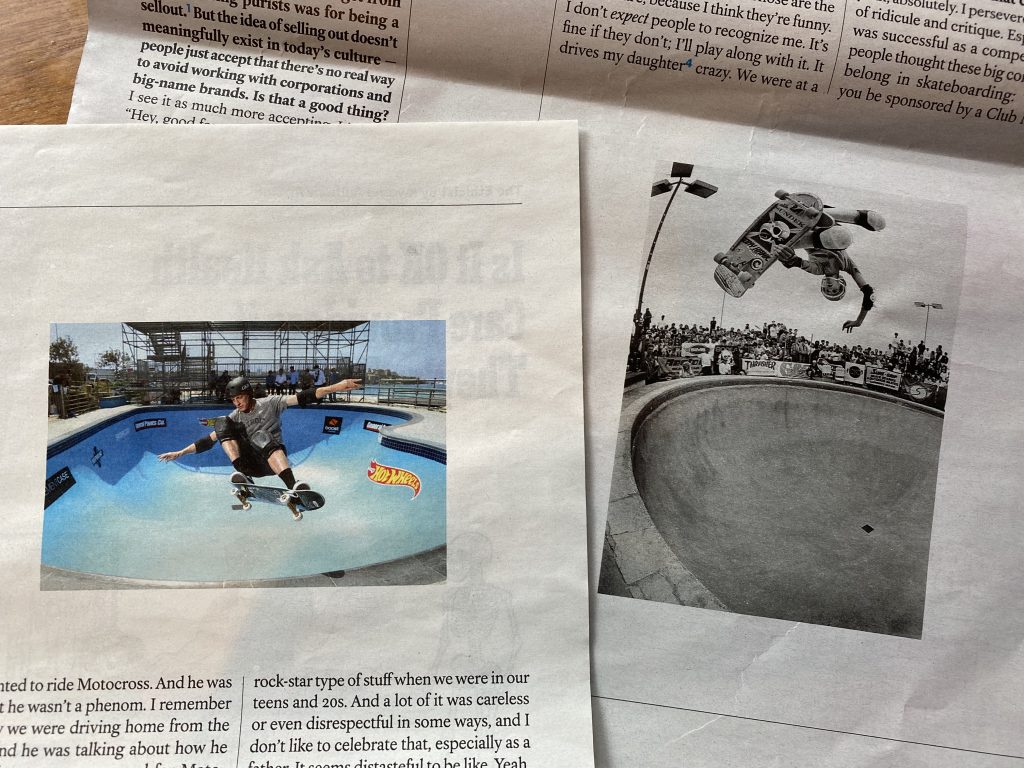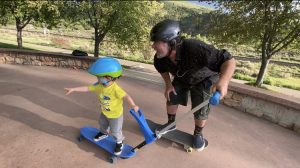
Ah skateboarding. The sport that continues to be a big part of my life even though I don’t know how to do it.
Zephyr in the 1970s
My interest in skateboarding began with the 2001 Dogtown and Z-Boys documentary directed by former Zephyr skateboard team member Stacy Peralta. The film chronicled the pioneering of the team, the evolution of skateboarding as a result of Peralta, Tony Alva, and Jay Adams, and how this group of talented derelicts shaped the surf/skateboard culture for future generations. In 2005, Lords of Dogtown, which was also written by Peralta and starred Emile Hirsch and Heath Ledger, provided an entertaining Hollywood spin on the lore of the Z-Boys.
While both films are very different, they both show how the ragtag outsiders from a rough part of town found their passion and, ultimately, fame through a sport that at the time wasn’t even considered a sport. I find it fascinating that the whole thing started because the drought California was experiencing in the 1970s resulted in no waves to surf and no water in pools – so these kids jumped fences and began skateboarding those pools rather than skating down the street like they had been doing. And a new era was born.
But as the years went by, with the exception of Peralta, who is definitely the most successful of the crew, the Z-Boys didn’t continue to garner the type of attention that put skateboarding on the pop culture map. Although Alva has enjoyed a longstanding relationship with Vans that began in 1974 (more on Vans in a minute), Jay Adams ended up spending more time in jail than on a skateboard as a result of various assault and drug charges. He died of a heart attack in 2014 at age 53.
Tony Hawk
Meanwhile, Tony Hawk, of the original Bones Brigade (a 1984 video also produced by Peralta), brought skateboarding from subculture to pop culture. Arguably the most recognized professional skateboarder of all time, Hawk initially made his mark when he landed the first documented 900 in 1999. Over the years he has also become an entrepreneur, the owner of the skateboard company Birdhouse, and launched a video game series. Since its debut over 20 years ago, Tony Hawk’s Pro Skater has spawned 18 titles, including ten main-series titles, four spin-offs, and four repackages.
Although Hawk has been deemed one of the most influential skateboarders in history, he has also endured criticism for his endorsement deals with mainstream companies like McDonald’s, Jeep, and Hershey’s. In the 1990s and early 2000s, the “sellout” mentality was a big part of the discussion when it came to what was considered cool. As a result, Hawk caught a lot of shit for his “media whore” persona but, unlike some of the more hardcore Dogtown skaters, Hawk’s longevity speaks for itself. At 53 years old Hawk is sponsored by Birdhouse, Vans, Independent, Bones, and Nixon. Hawk also started the Tony Hawk Foundation, which helps build skateparks in underprivileged areas.

Continuous Rise
But the allure of skateboarding runs deeper than Hawk and Dogtown. In 2016 I wrote about skateboarding becoming an Olympic sport and how its debut was slated to happen at the 2020 Summer Games in Tokyo – which of course is happening this summer. In 2017 I wrote about why Thrasher Magazine’s insane skateboard scavenger hunt contest King of the Road was worth watching. That show introduced me to Chad Muska who became my favorite skateboarder because in the 1990s he was known for riding rails with a boombox on his shoulder. My favoritism grew when we realized that Fleet and Muska share a birthday. Last month I read and reviewed Vans founder Paul Van Doran’s book which I could not put down. My favorite quote from Van Doran about skateboarding: “When skateboarders adopted Vans, they gave us an outward culture and an inner purpose. Skateboarders discovered our shoes at a moment in time when the shoe industry was changing, and they helped us find a niche and identity we maintain to this day.”
Last week my mother gave me an article from New York Times Magazine about Hawk. I’m sure no one in the 1980s or 1990s could have ever seen that coming but here we are. In the article, which is written in a Q&A format, Hawk describes how being an outcast among outcasts was “so crushing” and that he had to learn to ignore the people who called him a sellout for furthering his career. He also points out how skateboarding has evolved from being all about competing and getting sponsored to social media presence. In fact, his 28-year-old son Riley is a professional skateboarder as well and has over 300,000 followers on Instagram.

Family Skate
Clearly skateboarding has come a long way from its renegade roots and it’s exciting to see because even though I don’t know how to do it – my closest comparison is snowboarding – it’s important to Wookie and Fleet. Wookie grew up skateboarding and now Fleet is doing the same. We recently took him to our local skatepark for the first time on an Ookkie Learning Skateboard that is designed for kids Fleet’s age. And wow did he love it. I’ll never forget our brave boy trying to ollie on his board while the three us were wearing Vans and our dog Zephyr was at home sleeping. Skateboarding is without a doubt part of my family – even my mother wants to read about it.


Leave a Reply